If there’s something fishy about your water—perhaps it smells funny, leaves a bad aftertaste or seems to be too cloudy to be safe—and you want a solution to enjoy safer, great-tasting water, you have two options: Drink bottled water or add a filtration system to your home.
In the fight between bottled water versus water filters, what’s the right choice for you? Discover the differences, from examining the benefits of each to looking at the overall difference in cost.

Round 1: Bottled Water vs. Water Filters
Bottled water’s greatest benefits are mobility and convenience. You can take it with you and drink anywhere. The cap is sealable, so you don’t have to worry about spilling, and the bottle is durable enough to withstand falling or being crushed by the other items in your bag. You can also buy bottled water nearly anywhere. This makes it more convenient than other solutions, like drinking from a water fountain, where sanitation is questionable.
A little less convenient, 5-gallon jugs of water for cooler systems are a popular option for many people. They can be purchased at hardware and grocery stores, or in some instances people rely on a delivery service. They are cumbersome, however, and take up a lot of space, but they are practical for supplying large volumes of water.
Convenience isn’t just for bottled water or water jugs, however. Water filters can be purchased to filter all the water in your home or just the water coming from your kitchen or bathroom sinks–and you’ll have immediate access to it. Many under sink filtration systems are compact, so you’re not wasting valuable storage space.
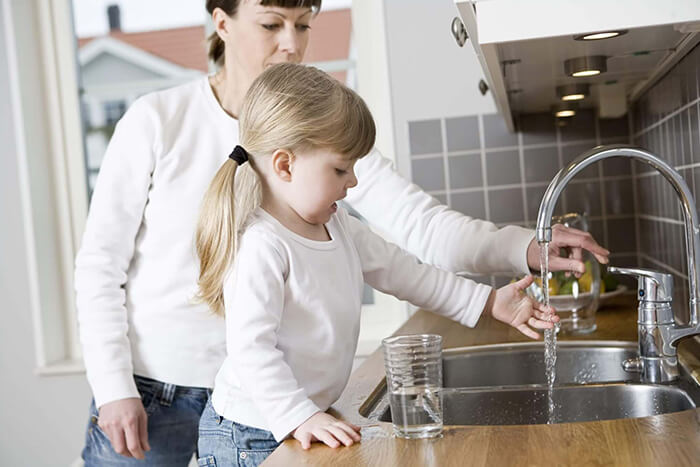
Schedule a Free Water Diagnosis
Skip the hard stuff. Instead, let the professionals handle your home water problems. A Water Pro can test your home water to determine the exact solution you need.
Round 2: Which Option Is Cheaper?
It’s time to up the ante in the matchup between bottled water versus water filters with a look at cost considerations, and how either choice impacts your wallet.
If you want to go the extra mile in protecting you and your family from contaminants and drinking water of questionable quality, you’re going to need to make an investment. Bottled water seems relatively cheap, but over time, the cost adds up. Can the same be said about water filters? Let’s find out.
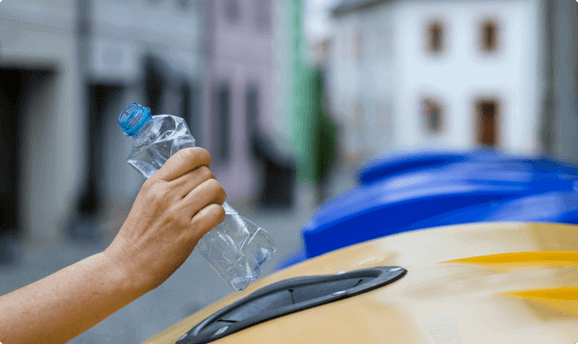
How Much Does It Cost to Drink Bottled Water?
It’s a no-brainer that buying bottled water in bulk (35-48 bottle/pack) is much cheaper than going to the local convenience store to purchase a single bottle of water for $1.99 or more.
Where can you buy bottled water in bulk? Giant box stores are one option. However, businesses like Sam’s Club and Costco require a membership fee that starts at $50 or more per year.
At the time of publishing, the top-rated water bottle item at Sam’s Club lists a 40-pack of 16.9-ounce bottles of Ice Mountain for $6.54. That’s about 16 cents a bottle, which seems cheap, right? But how long will that 40-pack last?
If you are in a home which uses and drinks a total of one gallon of bottled water per day you will go through about 7.5 bottles of water each day, meaning a 40-pack will last less than six days. Perhaps you use a little less than that and a case can last a full week. If so, you will pay roughly $340 per year on bottled water, and that’s if you buy only the value-priced 40-pack cases from Sam’s Club or Costco.
How Much Will a Water Filter Cost Me?
While the cost of drinking bottled water progresses incrementally, a water filter is going to be more expensive upfront. In many cases, a Water Pro can install a simple-yet-effective filtration system under the sink. The overall price varies, based on which type of system you need, whether it’s for under the sink or for the whole home, and potential plumbing costs, but keep in mind this is a one-time investment. Plus, the filters last up to 6 months in most filtration systems before needing replacement.
If you’re using a gallon of water per day, consider how this reflects in your water bill. According to the EPA, if your home’s water bill is set at a uniform rate structure, the average charge is $0.00295 per gallon. Using a gallon of water per day from your home’s tap will cost you roughly $1.08 per year, plus the cost of the filtration system and periodic filter changes.
When you combine the small increase in your water bill, the cost of the system and one filter replacement the first year, you’ll soon start to notice a return on your investment. Your savings will really take off in the second year when all you’re doing is replacing the filter at regular intervals.
Final Round: What Filters Remove From Your Water
In the debate between bottled water versus water filters, the number of contaminants being reduced should shift the argument one way or the other. As determined, water filters are cheaper, but are they reducing as many contaminants, and is it possible they’re reducing more than some bottled water brands?
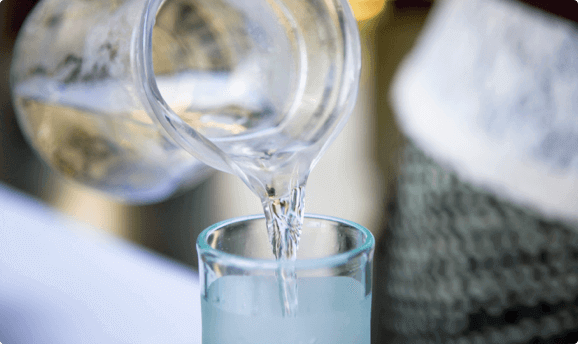
Bottled Water
There are two main types of bottled water. The difference between the two is the source of where the water comes from.
- Spring Water: Evian, Crystal Geyser, Ice Mountain, Fiji
- Purified Water: Smartwater, Dasani, Aquafina
To use “spring water” on its label, brands such as Evian, Crystal Geyser and Ice Mountain must actually get their water from a spring. The Food & Drug Administration (FDA) ensures spring water companies adhere to good manufacturing practices by setting quality standards. Spring water companies typically filter their water with 0.5-micron filtration, which reduces sediment and microbial cysts from the water.
To combat the growth of microorganisms in the water after it’s bottled, these companies use a treatment called ozone. This disinfection method allows the bottled water to sit on shelves of supermarkets for months at a time.
Purified water is the most regulated form of bottled water for the FDA and the International Bottled Water Association (IBWA). The IBWA was formed to raise the standards set by the FDA for stricter bottled water regulations.
The IBWA states in its Bottled Water Code of Practice that “Purified water is water obtained by distillation, ion-exchange treatment, reverse osmosis, or other suitable processes.” To acquire the IBWA certification you must comply “with the regulations of the federal Environmental Protection Agency with respect to drinking water. It (your water) contains no added substance.”
To adhere to the standards set by the FDA and IBWA, purified water companies do a great job of filtering water. But there’s a different story to tell when the water goes in a plastic bottle.
How Plastic Bottles Impacts Your Water
Orb Media, a nonprofit journalism organization, released a report in 2018 that stated 93% of bottled water showed signs of microplastic contamination. The research included 11 brands—including Dasani, Evian and Aquafina. The report found 63% of the plastic debris in bottled water (10.4 particles per liter) were fragments like polyethylene terephthalate (PET).
The migration of PET from the plastic bottle — mainly the cap — to the water poses a problem for bottled water drinkers. Although the health risks are still being assessed, microplastics are harmful to the environment and are rarely recycled.
Water Filter
Many people think that if their home is supplied with municipal water, their water is already being treated for harmful contaminants. While this is true, to an extent, municipal centers can’t do anything about the contaminants that find their way into your water while traveling from the treatment facility to your home. Corroding water lines and excess chemicals, like chlorine disinfectant, can enter your home even after being treated.
There are a number of filtration systems that reduce different water contaminants. Some are more thorough than others—so it all depends on the type of filtration you wish to install. A Water Pro can test your water to identify the perfect filtration solution for your home.
Environmental Factors
In 2022, the bottled water industry in the United States reached nearly $46 million in sales. While the industry continues to boom, concerns over its environmental impact are worthy enough to consider in the bottled water versus water filter debate.
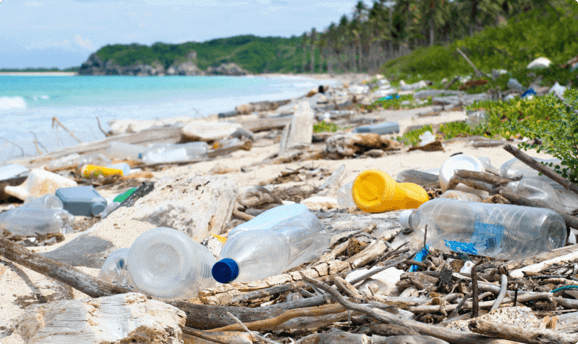
Bottled Water
It takes about 2 liters of water to produce the plastic for a liter of bottled water, plus a third liter to fill the bottle. Most plastic used for bottled water is made from polyethylene terephthalate (PET). Companies claim they use this material because it’s thinner plastic, thus cutting back on plastic waste, but humanity’s reliance on single-use plastic bottles is occurring on a detrimental scale.
Water Filter
Filtering your home’s drinking water causes minimal environmental impact. Most drinking water and whole home filtration systems don’t require any energy to filter your water.
Water waste is nearly non-existent with home filtration systems as well. The only filtration style that produces any waste is reverse osmosis (RO), as it typically takes 3 or 4 gallons of unfiltered water to produce a gallon of purified water from an RO system. This ratio may seem high, but when considering the amount you’re drinking per day, using an RO system is equivalent to flushing your toilet 1-2 more times than usual. Reverse osmosis is a proven solution for safer, cleaner drinking water–that’s why most bottled water brands use this method as well.
What’s the Best Water Filter for Your Home?
When matching up bottled water versus water filters in the fight against water contaminants, the clear winner is performing your own in-home filtration with a water filtration system.
The next step is having your local authorized EcoWater dealer test your water to identify the right solution for your home.
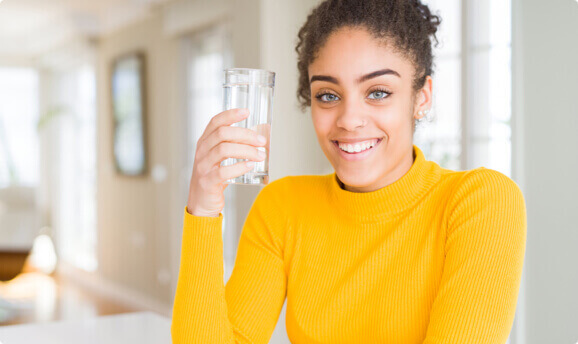
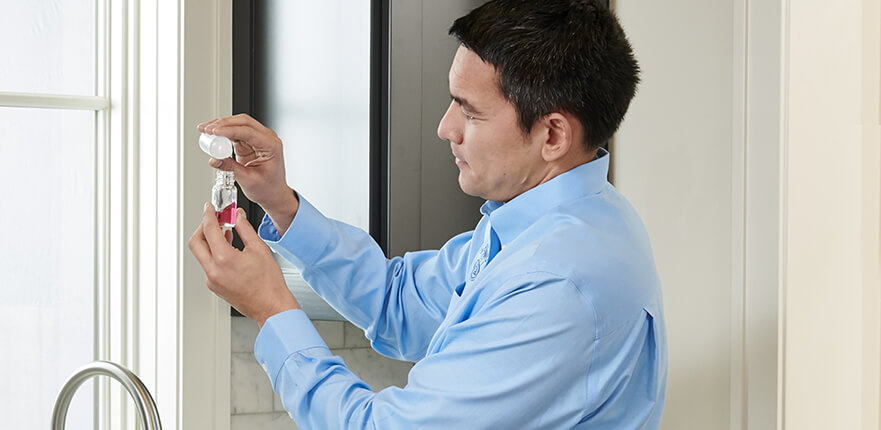
Solve Your Problem Water
When it comes to home water quality and how it can impact your health, you don’t want to mess around. Have your authorized local EcoWater dealer test your water to find the perfect solution.
